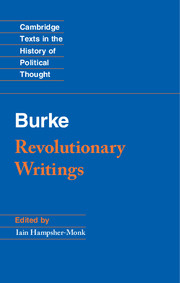 Revolutionary Writings
Revolutionary Writings Book contents
- Frontmatter
- CONTENTS
- Preface
- Acknowledgements
- Editor’s introduction
- Further reading
- Chronology
- Notes
- A note on the texts of Reflections and the Letter on a Regicide Peace
- Abbreviations
- Reflections on the Revolution in France
- The first Letter on a Regicide Peace
- Appendix Variant readings
- Index
- References
Editor’s introduction
Published online by Cambridge University Press: 05 June 2014
- Frontmatter
- CONTENTS
- Preface
- Acknowledgements
- Editor’s introduction
- Further reading
- Chronology
- Notes
- A note on the texts of Reflections and the Letter on a Regicide Peace
- Abbreviations
- Reflections on the Revolution in France
- The first Letter on a Regicide Peace
- Appendix Variant readings
- Index
- References
Summary
Edmund Burke was born in Dublin in 1730 to a Catholic mother and a Protestant Father. He was educated in Ireland at both Catholic and Quaker schools, and at Dublin’s Anglican university, Trinity College, before studying law at the Middle Temple in London. His initial ambitions were literary and his first two works, the Vindication of Natural Society (1756) and - more particularly - the Philosophical Enquiry into the Origin of our Ideas of the Sublime and the Beautiful (1757), gained him public recognition, the company of London’s literary elite and the editorship of the newly-founded Annual Register a political and literary review. Need for a secure income led him into political service, briefly as secretary to William Hamilton MP, on the staff of Lord Halifax, the Lord Lieutenant of Ireland; but in 1765 he formed his major political connection, as secretary to Lord Rockingham, the leader of the Whig Party. Although twice briefly Paymaster General (1782 and 1783), his major role was as opposition pamphleteer, political fixer, and spokesman for the Rockingham Whigs. Burke produced polemical writings and speeches on a wide range of issues critical of the government, opposing its controversial taxation policy in the American Colonies, seeking reform of the tangled skein of national and royal domestic finances, of the East India Company’s administration of British India, and, less publicly in that stridently Protestant age, to relieve the restrictions imposed on Irish Catholics in his home country.
- Type
- Chapter
- Information
- Revolutionary WritingsReflections on the Revolution in France and the First Letter on a Regicide Peace, pp. xi - xxxviPublisher: Cambridge University PressPrint publication year: 2014
